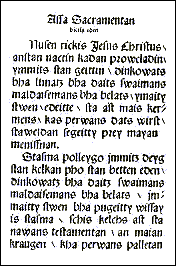 The
Prussians lived near the Baltic Sea on the territory of Modern Poland and
Russia. It was a semi-civilized nations who lived as hunters and firermen
mainly. They traded their amber with neighbour peoples and guests, but
were too weak and uncapable of creating a state.
The
Prussians lived near the Baltic Sea on the territory of Modern Poland and
Russia. It was a semi-civilized nations who lived as hunters and firermen
mainly. They traded their amber with neighbour peoples and guests, but
were too weak and uncapable of creating a state.
Prussian tribes were located the westernmost among all Baltic peoples, that's why German invasions started in the 12th century first hit Prussians. Soon their territories (in the 13th century) came under Teutonic rule, and that meant the end of Prussian independence in policy, culture and language. Prussian language, though since then a lot of works appeared in Old Prussian, was committed to extinction. In the 14th - 16th century German researchers compose Old Prussian dictionaries, translate the Bible, write some works about the language. But Old Prussian practically could not be heard alive at that time. In the 17th century it was dead.
Prussian is referred to the East Baltic subgroup, though all Baltic languages, both extinct and living, are very much alike. Prussian is nevertheless much more archaic than Lithuanian or Latvian, the only existing Baltic tongues. Prussian had a phonetic system similar to Lithuanian, but there was a great distiction between long and short vowels. The noun declension preserved practically all Indo-European features. Judge for yourself (á-stems feminine singular):
IE
Prussian
Nom.
-á
-á
Gen.
-ás
-ás
Dat.
-ái
-ái
Acc.
-ám
-án
Old Prussian is believed to have more cases than just four (vocative, for example), but they were not found in the sources. Demonstrative and personal pronouns also have the same four or five cases; verb system is very simple with 2 tenses, 4 moods (including imperative, optative and subjunctive), and a big number of verbal nouns: participles, semi-participles, infinitive and supine. Passive, future and perfect forms could be, obviously, created by auxiliary verbs, among which the verb bút (to be) was the most important.
Nowadays Old Prussian studies suffer the revival. There are some materials
also on the Web. The detailed grammar, yet unwritten on the Net, will be
published soon in our Indo-European Grammars.